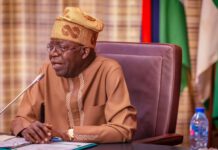The Senate has summoned the Minister of Finance, Mrs. Kemi Adeosun and the governor of Central Bank of Nigeria (CBN) Mr. Godwin Emefiele, to appear before it and brief the upper chambers on the monetary and fiscal policies adopted to salvage the current economic situation.
The Senate said the move has become imperative following last week’s report on the nation’s economic scorecard for the first quarter of 2016 by the National Bureau of Statistics (NBS) on inflation and unemployment levels.
The upper chamber of the National Assembly took the position after a motion by Senator Bassey Albert Akpan, PDP, Akwa Ibom North-East, titled, “An urgent need to address the present economic state of the nation”
In his presentation, Akpan said: “Aware that the National Bureau of Statistics, NBS, last week released the nation’s economic scorecard for the first quarter of the year 2016 for Gross Domestic Product, GDP, inflation and unemployment;
“It observes that the report depicts that the nation’s economy plunged into recession with a decline of 0.36 percent year-on-year in real terms which is a drastic drop from 2.11 percent in Q4 2015 in GDP;
“It further observes that from the report, unemployment rate rose to 12.1 percent in Q1 2016 from 10.4 percent in Q42015. Underemployment also increased to 19.1 percent from 18.7 percent in the same period, while the rate of inflation rose from 9.6 percent in January 2016 to 13.8 percent in April 2016, with the attendance increase in prices of basic food commodities and services in the country;
“The Senate is worried that the declining Gross Domestic Product, GDP, and unemployment, besides the current high inflation rate, clearly shows that the economic policies are not achieving desired impact and requires an urgent review to avoid further plunge in our economy;
“It is further worried that the current economic contraction is the first major drastic slump since June, 2004, which, according to the Central Bank of Nigeria, is a 12-year-low, while the World Bank’s position is a 21-year-low;
“It recalls that the Central Bank of Nigeria had in March, 2016, deployed a contracting monetary policy increasing benchmark interest rate from 11 percent to 12 percent and cash reserve ratio from 20 percent to 22.5 per cent.
“The question is why contracting monetary policy, instead of expansionary monetary policy of boosting economic activities at such a critical time as this;
“Deeply concerned that the continued complacency of the current state of our economy, if allowed unchecked, will set the tone for a full blown economic recession by the end of June 2016 as already confirmed by the Central Bank of Nigeria in her Monetary Policy Committee, MPC, meeting of yesterday(Tuesday),” Akpan said.




